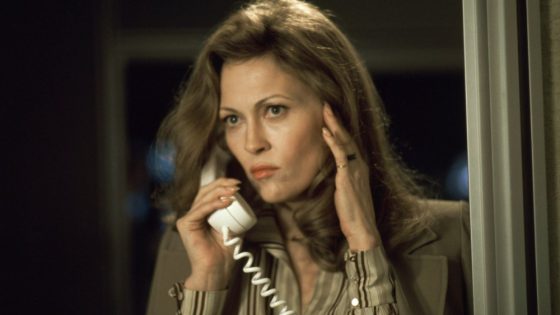Celebrity documentaries are a dime a dozen these days. But celebrity docus that don’t serve as an infomercial for a star are rare. Laurent Bouzereau‘s HBO documentary “Faye,” about Faye Dunaway, is one of those rare celebrity docus.
Instead of avoiding Dunaway’s demons, Bouzereau dives right into them. In the first minute of the docu Dunaway tells the director, “Can we shoot? We need to shoot. I’m here now. C’mon. I really would like to shoot.” Minutes later Bouzereau cuts to the infamous “Tonight Show” clip where Johnny Carson asks Bette Davis who she would never want to work with again and she replies, “Faye Dunaway. Everybody who you put in this chair would tell you the exact same thing.” (Dunaway and Davis co-starred in the 1976 TV film”The Disappearance of Aimee.”)
It’s a refreshing start to celeb driven doc. But what makes the 90-minute film really standout is Dunaway’s candidness about everything from her reputation to her bipolar disorder to her iconic career.
The actress reveals that director Arthur Penn insisted on casting her in “Bonnie and Clyde, in spite of Warren Beatty’s hesitation. Dunaway also explains why she walked off the set of Roman Polanski’s “Chinatown” and why her co-star in film, Jack Nicholson, nicknamed her the dreaded Dunaway, or “Dread.” The origins of the famous Terry O’Neill photo of the star posing at the Beverly Hills Hotel after winning an Oscar for her performance as Diana Christensen in “Network” are described in detail. Even the 1981 camp classic “Mommie Dearest,” about Joan Crawford that almost destroyed Dunaway’s career, is explored.
In addition to her career, Dunaway is forthright about her alcoholic father, her own alcoholism, adopting her son, Liam Dunaway O’Neill, and her love life with men including Peter Wolf, Terry O’Neill, and Marcello Mastroianni.
In addition to Dunaway, “Faye” features interviews with several people who are friends with or worked with the actress including Sharon Stone, Mickey Rourke (her co-star in “Barfly”), directors James Gray (“The Yards”), Jerry Schatzberg (“Puzzle of a Downfall Child”) and Howard Koch (assistant director of “Chinatown”).
Bouzereau, who also directed HBO’s “Natalie Wood: What Remains Behind” doc, worked with Steven Spielberg‘s Amblin Partners on “Faye,” which will be released on July 13. The film premiered in May during the classics section of this year’s Cannes Film Festival.
How did you decide to open the film with Dunaway demanding to start shooting?
Bouzereau: I wanted people to know, number one, that Faye was totally comfortable being filmed at all times and also I wanted people to know that this isn’t a vanity piece about Faye Dunaway. Right after that moment of intensity with her, I wanted the interview to explain that you can concentrate on that side of her and place a judgment on that, but you also have to look deeper. That became the mission of the film. You come full circle on it and start to understand why she’s like the way she is. And by the way, James Gray, who was interviewed for the film said that he’s known of male actors who have behaved equally as difficult as Faye, who are not labeled in the way that she has been labeled.
We don’t get Dunaways reaction to the Bette Davis clip. Why?
When I approach a big life like Faye’s or like Natalie Wood’s, I’m very conscious that it’s not going to be everything because if you do that, then the film loses its focus and its backbone. So, I think that sometimes giving a hint of something like the Bette Davis quote just feeds into the thematic without necessarily going down the rabbit hole of what happened on set and all that stuff.
Mickey Rourke is interviewed in the film. Did you reach out to any of her other co-stars like Warren Beatty or Jake Nicholson?
The problem a lot of times is schedule and proximity. Unfortunately, it doesn’t always work out. So, that’s what happened.
Dunaway’s career was almost ruined after she did “Mommy Dearest.” Was that because the film was bad or was she a victim of sexism?
“Mommy Dearest” is just not a well-made film. I do think that Faye’s performance is extraordinary. In fact, everybody’s performance in the film is great. I just don’t think it’s a well thought out movie. It’s very flat. But around that time a lot of male actors were making horrible films. Just think about “Ishtar” with Dustin Hoffman and Warren Beatty directed by Elaine May. Did that become as big of a deal as Faye Dunaway doing “Mommy Dearest”? No. In fact, nobody’s talking about “Ishtar.” That didn’t tarnish the reputation of everyone involved, and yet Faye makes this one movie, and it takes on this dimension. So, yes, I do think that she has been unfairly treated. Part of this film was really to show that during that incredible time in the seventies when the best filmmakers were coming into cinema, and the best movies were being made there was Faye alongside all of them making those films reach a level that without her, would have never been that high.
“Faye” debuts on HBO at 8 p.m on July 13.
Source Agencies



